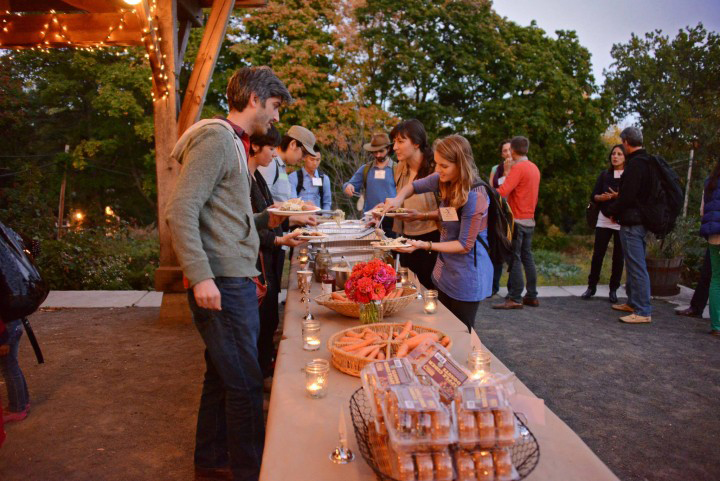
Courtesy of Yale School of Forestry and Environmental Study
A workshop on recycling human urine and a roundtable discussion about farmers are just two events on the docket of the annual Yale Food Systems Symposium tomorrow in Kroon Hall.
The event -— hosted by the Yale School of Forestry and Environmental Studies — is a food-centered conference that aims to foster a dialogue about achieving a sustainable food system. Four years ago, the food symposium began at FES amidst growing interest in food and sustainability in the Yale community.
In the years since, the symposium has expanded out from FES to include many Yale schools and the New Haven community. All 300 tickets for the event were sold out last week.
According to symposium organizers, the annual event has changed in size and scope since 2013, when the symposium became one of the first comprehensive university conferences of its kind.
The symposium has focused on a different theme each of the last four years. This year’s theme — “Feeding a growing world — Perspectives in 2016” — takes an interdisciplinary approach to food and includes input from the Yale Divinity School, the School of Management and the School of Public Health.
“We don’t necessarily agree on all of the [food-related] problems, because they are so complex,” said Sarah Sax FES ’17, one of the six co-chairs who helped plan the symposium. “What we can agree upon is that we can collaborate across a variety of fields to try to solve these issues.”
The symposium not only unites a wide range of Yale professional schools, but also attracts a diverse group of attendees including farmers, policy makers, entrepreneurs, students, food service professionals, scholars and nongovermental organization employees. Symposium organizers emphasized that the conference aims to tackle issues outside those usually discussed in academic settings.
Even the symposium format attempts to break from traditional approaches, offering panels, films and interactive workshops on food in addition to traditional lectures.
“When such a diverse group of individuals comes together, you get to talk about their personal experience trying out new things,” said Mark Bomford, director of the Yale Sustainable Food Project. “My interest in staying current with important changes in sustainable food and agricultural thought and practice is because I want Yale’s students to be placed at the forefront of this conversation.”
Bomford said the conversations fostered by the symposiums in past years have ranged from new tractor implements to better ways of measuring greenhouse gases.
This year’s lineup includes two keynote speakers bookending the symposium’s midday programming. At 9 a.m., Ann Tutwiler, director of the global research organization Bioversity International, will give the first lecture of the day. Tutwiler’s organization uses scientific evidence to improve biodiversity in low-income countries. Tutwiler previously worked for the United States Department of Agriculture developing international research strategy. At the end of the day tomorrow, the second keynote speaker and president of The Land Institute will discuss his work providing “an alternative to current destructive agricultural practices.”
In addition to educating its attendees, the symposium will also facilitate interactions between the lecturers and panelists. For example, Florencia Montagnini, a senior research scientist at FES, told the News she plans to attend several other panels after giving her own presentation on agroforestry.
Organizers said that about half the symposium attendees will be Yale undergraduate and graduate students. The remaining attendees will include panelists and other members of the New Haven community — from businesspeople and professors to activists, farmers and academics. Tickets were available to Yale students for free and to the public for $35.
Food is central to the day’s programming. Organizers said they have carefully prepared a locally sourced menu for all the day’s meals. Lunch will be prepared by chefs from the local restaurant Miya’s Sushi, FES and SOM students Dinner will feature a pig purchased from an FES alumna who raises acorn-fed pigs.
Bomford said he hopes attendees will come away from the symposium with a greater appreciation for the importance of food in daily life.
“Food is an essential prerequisite to all life,” Bomford said. “It’s also a big part of what makes humans human, not just in the sense that we’re materially constituted from food, but also in the way that you find food embedded through society, culture, identity and meaning. Food remains relevant as long as life remains relevant.”







